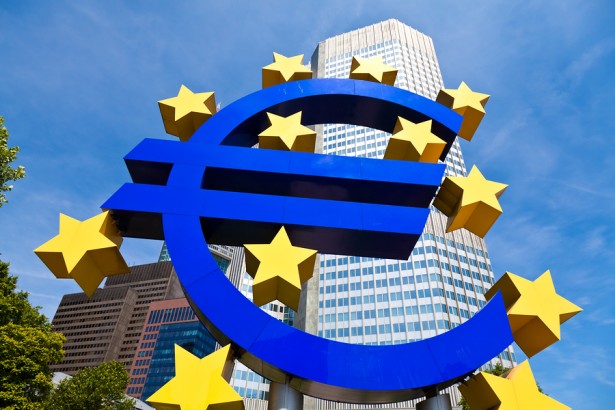European Central Bank (ECB) president Mario Draghi said in remarks Thursday that the central bank will purchase assets for two years in order to boost inflation and spur economic growth, a move similar to the Federal Reserve’s quantitative easing.
Draghi told reporters at a press conference in Naples, Italy that the ECB will acquire covered bonds this month and then proceed to buy asset-backed securities sometime this quarter. The ECB head already confirmed that the purchases will have a “sizable impact on the balance sheet.”
The ECB estimates that as much as $1.3 trillion in assets could be added to the balance sheet. Draghi’s easing plan will cause the ECB’s balance sheet to reach early 2012 levels. This will be in addition to loans being issued to financial institutions to increase credit in the consumer economy.

Interest rates remained unchanged at record lows – since June, the ECB has slashed interest rates twice, including at negative levels.
After the announcement, the euro stayed relatively the same at $1.2640. The euro’s exchange rate has been weak, and recently fell to a two-year low against the United States dollar. Some eurozone economists are content by this decline because it can increase exports and adds to inflation through higher priced goods.
With these financial instruments, the ECB wants to reach its inflation rate objective of two percent, though the inflation rate is currently at a five-year low of 0.3 percent. In other words, ECB policymakers concur that it will do whatever they think is necessary to further boost inflation, create economic growth and enhance access to credit.
Here is a key statement made from Draghi at the media event:
“The new measures will support specific market segments that play a key role in the financing of the economy. They will thereby further enhance the functioning of the monetary policy transmission mechanism, facilitate credit provision to the broad economy and generate positive spillovers to other markets. Taking into account the overall subdued outlook for inflation, the weakening in the euro area’s growth momentum over the recent past and the continued subdued monetary and credit dynamics, our asset purchases should ease the monetary policy stance more broadly.
They should also strengthen our forward guidance on the key ECB interest rates and reinforce the fact that there are significant and increasing differences in the monetary policy cycle between major advanced economies.”
Draghi has appealed to eurozone nations to support the stimulus measures as Germany has had some reservations over the plan.
According to the Wall Street Journal’s MarketWatch, Barclays economists wrote in a note Tuesday that it expects the ECB to purchase government bonds; the ECB averred that it’ll buy assets in nations with debt rated below BBB minus. However, financial experts are yet to be in agreement that such a practice would assist such cash-strapped countries, like Cyprus, Greece and Italy.
As the U.S. central bank further reduces its aggressive bond-buying program, the ECB begins to accelerate its own easing initiatives.
The general public doesn’t seem to be in support of the plan as hundreds of protesters gathered outside of their meeting place and chanted: “Job insecurity, poverty, unemployment, speculation. Free us from the ECB!”



